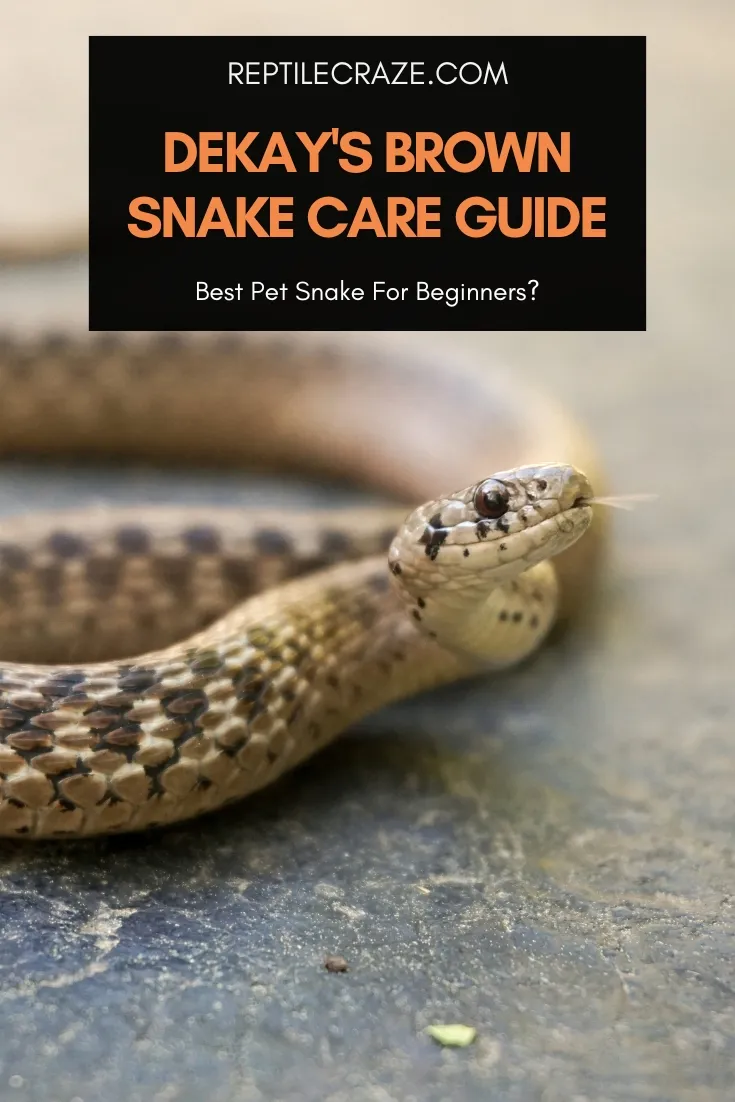
If you’ve never owned a snake before, you might want to dip your toes in the water with a low-maintenance option like the DeKay’s brown snake.
This species is easy to take care of and won’t require much in the way of daily care. Learn more about what it takes to properly keep brown snakes in this care guide.
DeKay’s Brown Snake Facts
| Common Name | DeKay’s Brown Snake |
| Scientific Name | Storeria dekayi |
| Natural Habitat | Forests, marshes, prairies in southern Canada, eastern US, and northern Mexico |
| Adult Size | 9-13” |
| Enclosure Size | 10” x 5” x 5” (10-gallon |
| Diet | Compost worms, grubs, and other invertebrates |
| Lifespan | 7 years |
| Experience Level | Beginner |
Where Do DeKay’s Brown Snakes Live?
In their natural habitat, DeKay’s brown snakes tend to favor moist areas, though you will also find them in some places that are unexpected.
They call forests and marshes home as well as the more arid climates of the prairie. Geographically, they are native to the southern part of Canada, east of the Rocky Mountains in the United States, and the northern part of Mexico.
DeKay’s Brown Snake Appearance, Colors, and Morphs
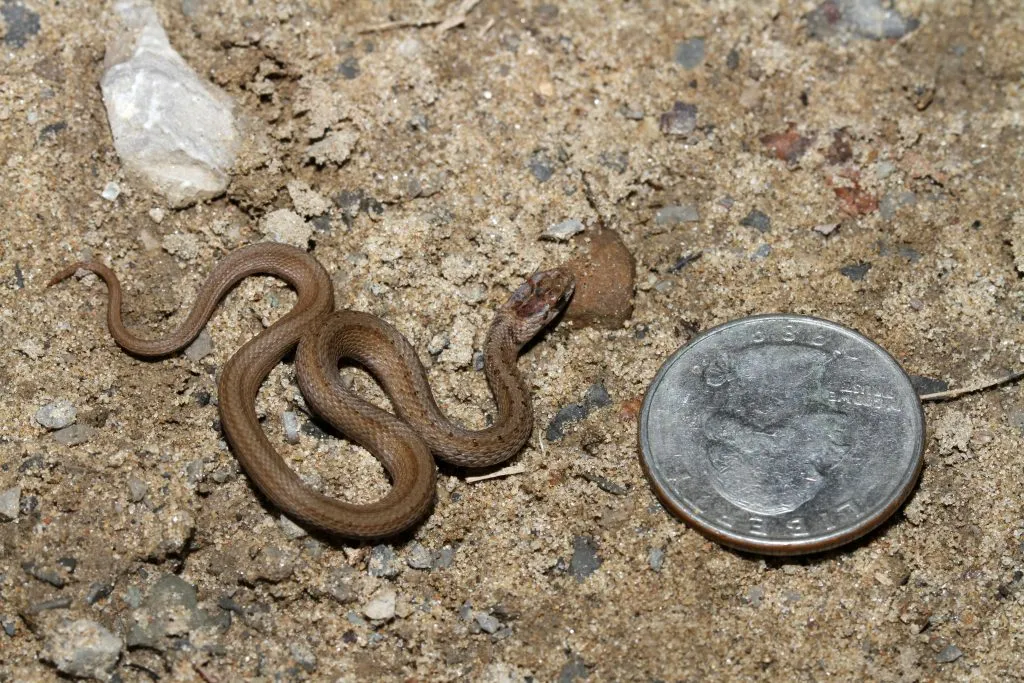
The appearance of the DeKay’s brown snake is given away by its name: most of these snakes will have a telltale brown color.
They range in color from a very light brown to a darker brown. The head tends to be darker than the body and often has a white marking on the neck. Younger brown snakes have a more distinct white band behind the head.
You can identify this species of snake from the more common varieties by a light streak down their backs, surrounded by two lines of black spots.
How Big Do DeKay’s Brown Snakes Get?
These snakes are relatively small with most ranging between 9 to 13 inches. Females tend to be a bit longer than males and may reach lengths of up to 20 inches in rare instances.
DeKay’s Brown Snake Lifespan
When taken care of properly, these snakes have a lifespan of up to seven years in captivity.
Most of the snakes in their natural habitat will not live this long, though it’s harder to estimate because these snakes tend to stay hidden when left to their own devices.
How to Care for DeKay’s Brown Snakes
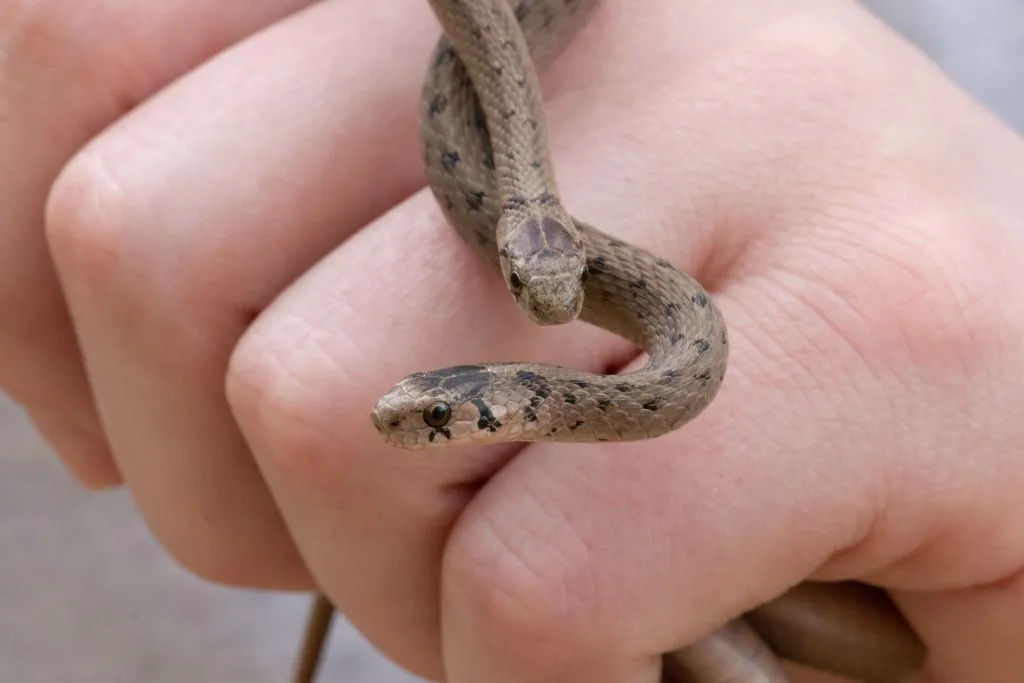
DeKay’s Brown Snake Tank Setup
Because these snakes are relatively small, you won’t need a massive enclosure for them unless they grow to the uppermost limits of their size range.
Most owners are able to comfortably keep a single brown snake in a 10-gallon
Lighting and Temperature
For the most part, this snake species requires very little in the way of special accommodations. Many are quite content to live in the ambient temperatures of your home with minimal need for temperature monitoring.
Temperatures should be kept around 72°F to 78°F (22°C to 25°C), which can align with the temperature you already have your thermostat set for in your home.
If you want to provide a basking spot, it should never exceed 90°F (32°C).
Because this is relatively low for a basking lamp, you might have more success with an under-tank mat heater like this one.
Place it midway through the
Lights should be kept to fluorescent bulbs that don’t emit heat. Keep them on for 12 hours a day, switching them off at night or switching to a red bulb for a few hours if you want to watch them.
Do DeKay’s Brown Snakes Need UVB?
In keeping with the low-maintenance theme of this pet snake, they also don’t require any UVB lighting.
You can stick with plain fluorescent bulbs that don’t put off much (or any) heat without regard for UVB lighting. This Exo Terra Repti-Glo 2.0 (now renamed the Natural Light bulb) could be a great fit.
Substrate
This snake loves to be moist, so you want to give them a substrate that can retain some moisture.
To this end, you can go with the Zoo Med Eco Earth Loose Coconut Fiber substrate or the Zoo Med Aspen Snake Bedding.
Inside of their hide, you may want to pile up some sphagnum moss to give them an extra wet place to retreat to when they need to cool down during the day.
Humidity
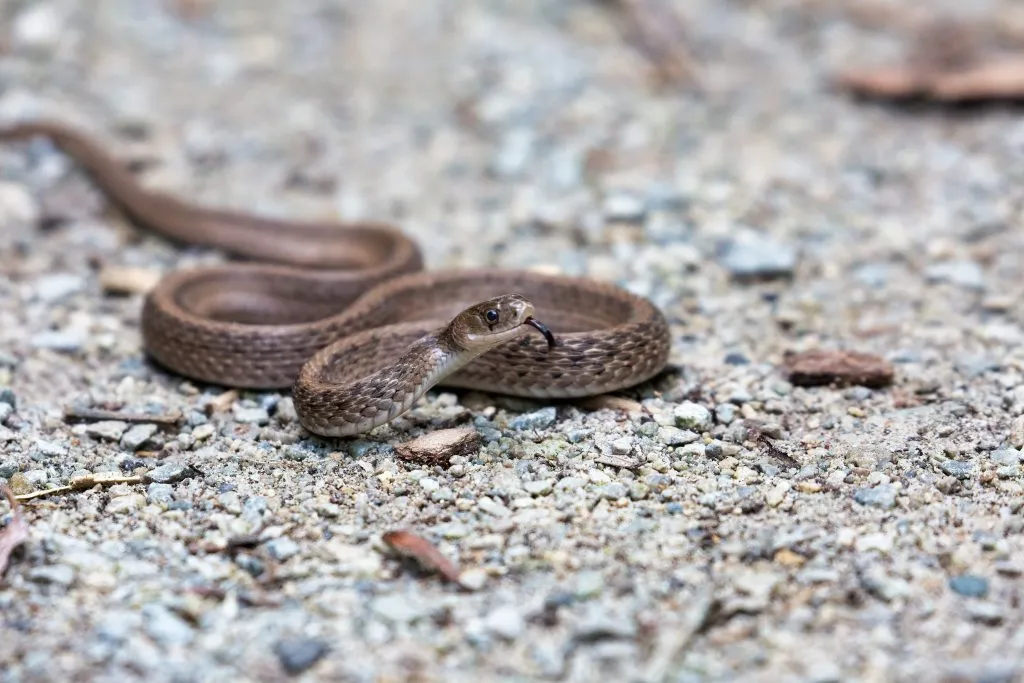
You’ll want a hygrometer in your enclosure for a DeKay’s brown snake as they love to keep moist. Ordinarily, you want the
They may need a little extra support in terms of their humidity levels during shedding times, so consider increasing this to around 60%.
To this end, you might want to keep a couple of water dishes in their enclosure. You can also mist them a couple times each day or use a reptile fogger to maintain consistent humidity.
DeKay’s Brown Snake Tank Décor
Most people find that their brown snakes aren’t the most active species of snake. For the most part, they tend to hide more than explore.
This is why you want to keep at least one large hide in their enclosure, but it may be better to keep one on both ends of the enclosure so that they have both a hot and cool spot to retreat to.
Hides that are easy to clean, like these Zilla Bark Bends, are a great option. A few small branches are also a nice addition to a brown snake enclosure.
If you really want to decorate your
While they won’t climb into the vines, they may want to hang out if the Fluker’s Repta-Vines are positioned over the ground of their enclosure. This is a great place to hide if you focus on keeping it moist.
How to Clean a DeKay’s Brown Snake Tank
These snakes tend to be very low maintenance, even when it comes to cleaning their enclosure. Like most reptiles, you need to spot clean daily to remove waste products.
If you can stay on top of this, you will only have to skim the surface of the substrate and replace it once a week. Remove about one inch of substrate to stretch the time between full cleanings.
Monthly, you should remove all substrate and hand wash the décor in the enclosure. Wash the
Always make sure that all cleaner is rinsed from the enclosure thoroughly before adding new substrate and placing the DeKay’s brown snake back inside.
DeKay’s Brown Snake Diet
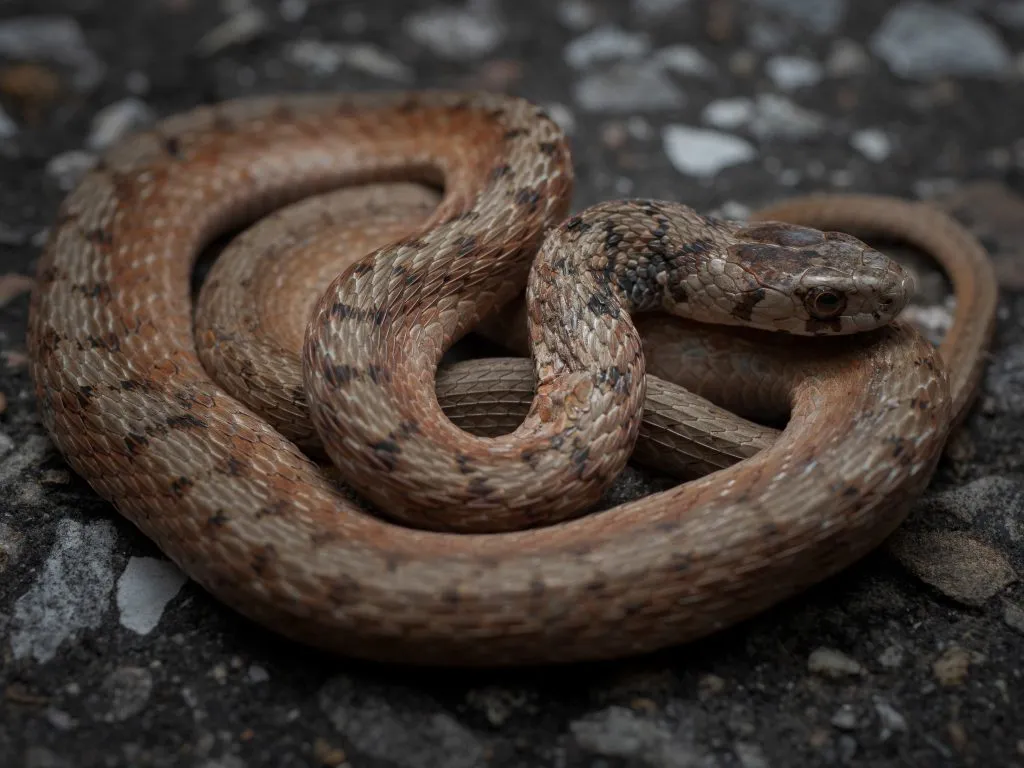
What to Feed
In the wild, these brown snakes tend to consume invertebrates that they find in the soil where they burrow.
This means that they frequently consume earthworms, grubs, slugs, and the occasional cricket.
Some of these delicacies may be more challenging to find for your pet, so you can stick to feeding them a steady diet of earthworms, mealworms, and silkworms.
If you want to give your DeKay’s brown snake a treat, consider tossing in a cricket or a snail.
How Often to Feed
Feed your brown snake a few times each week, usually every two to three days.
Owners who don’t want to keep up with feeding this frequently might want to consider allowing their snake to hunt on their own terms, supplying the terrarium with a steady supply of fresh compost worms that can take up residence here.
How Long Can They Go Without Food ?
These hardy snakes can go quite a while without
If you find that your snake is refusing food even after this time, take them to a veterinarian to address the issue.
Do DeKay’s Brown Snakes Need Water?

This species prefers a moist enclosure and one of the easiest ways to ensure there is water is to include a water dish or two.
As long as you are misting your snake and keep a bowl of fresh water available, you are likely doing enough to ensure that they remain hydrated.
Vitamins and Minerals
Keeping your DeKay’s brown snake healthy is relatively simple. A lot can be accomplished by just feeding them gut-loaded compost worms.
This frequently gives them all the calcium they need, but you may choose to supplement their diet in other ways. Zoo Med Repti-Calcium can be given roughly once a week.
DeKay’s Brown Snake Behavior and Temperament
Most of the time, you’ll find that the brown snake tends to hide. It prefers to spend time on its own, often retreating to its hides or even underground.
These non-venomous snakes don’t often decide to strike or bite, but they aren’t exactly what you would call a friendly species.
They are the ideal pet for someone who simply wants to watch and observe rather than handling.
If they feel threatened, they are more likely to release musk than they are to bite. While this can be extremely frustrating for owners who want to snuggle their snake, it’s harmless if you can look past the odor. Always put them back in a safe space after this happens.
Are DeKay’s Brown Snakes Good Pets?
DeKay’s brown snakes tend to be good pets if you don’t mind keeping them in their enclosure for most of the day. They’re easy to take care of and are well-suited to beginner reptile owners.
Keeping up with the care and maintenance of these pets is relatively easy, making them ideal for someone who can settle for simply watching them from behind the glass of their enclosure.
Can You Handle DeKay’s Brown Snakes?
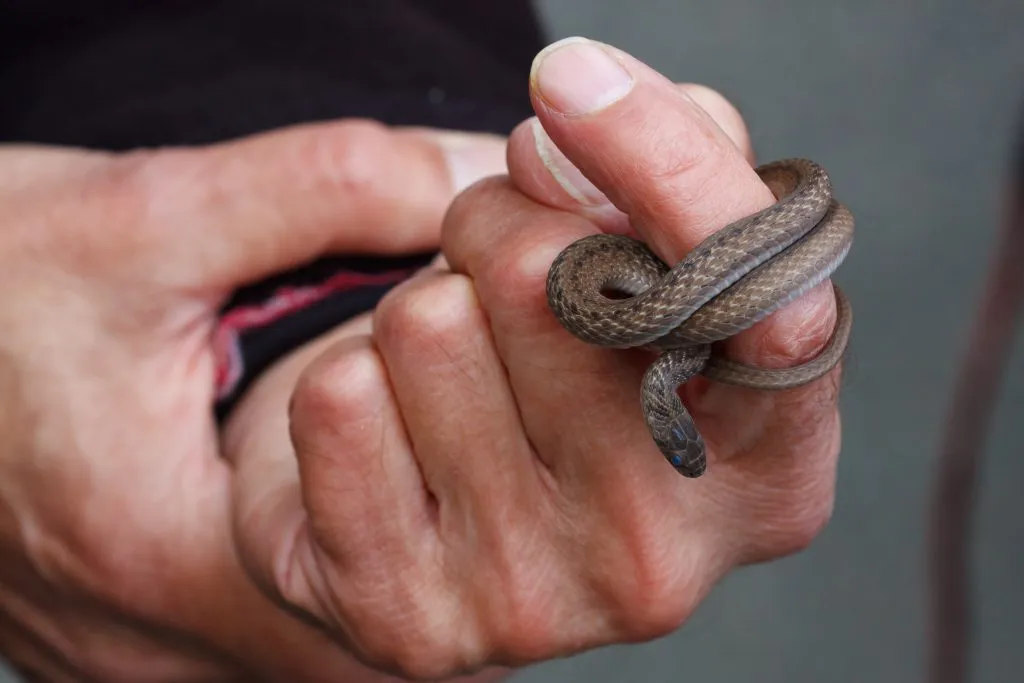
DeKay’s brown snakes can be handled, but it takes them some time to warm up to you. Get them used to you by hand feeding them and letting your hand rest in their enclosure.
Eventually, you can transition to picking them up. If they release their musk, put them back in their safe space and move forward more slowly next time.
DeKay’s Brown Snakes Common Health Problems
They have many of the same health issues that present with other species of snakes. You might notice that they get mouth rot if they encounter the right bacteria and have a weakened immune system.
Keep close tabs on their appetite and monitor for discharge or inflammation around the mouth. Lethargy is also a sign that something might be amiss with their health.
They may also suffer from parasites, respiratory diseases, and skin infections. Monitor their feces for signs of diarrhea that can be indicative of parasites.
However, parasites and infection can also show up via their breathing, itching, or skin irritation unrelated to a stuck shed.
Where to Buy DeKay’s Brown Snakes
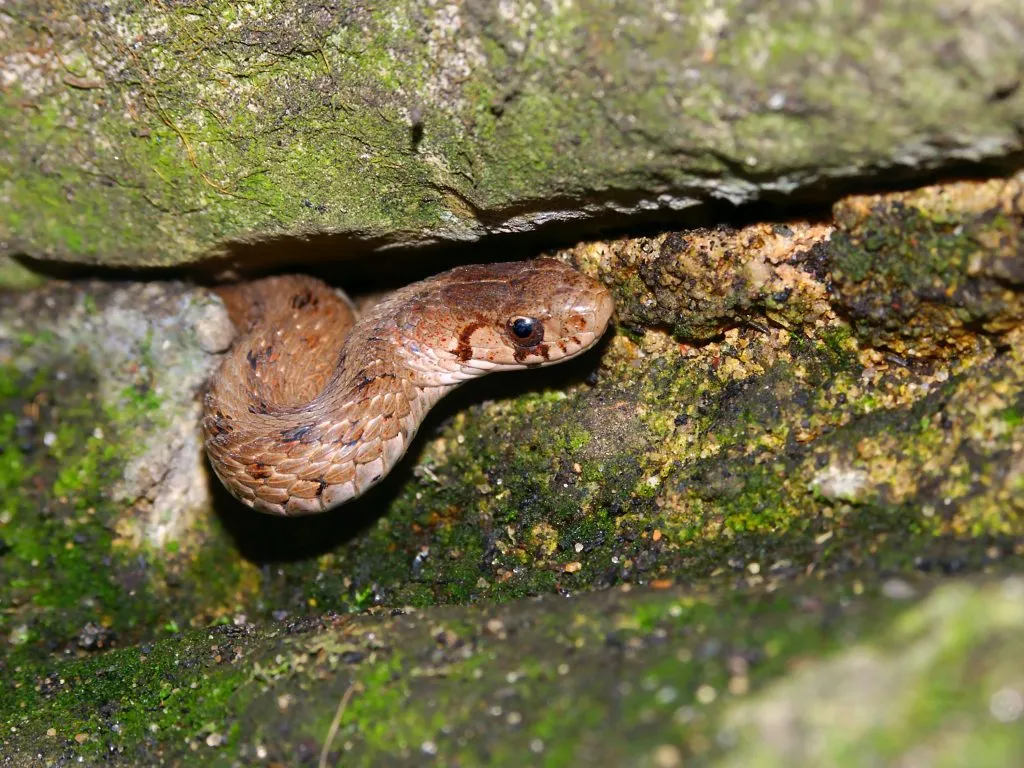
DeKay’s Brown Snakes Breeders
If you want to purchase a healthy brown snake, you should look for reputable breeders such as:
DeKay’s Brown Snake Price
Because these snakes are relatively common, particularly in the United States, you won’t pay an arm and a leg for them.
Most will come in around $30 to $50 though some captive-bred breeders will charge more. It’s rare to see them come in more than $100.
DeKay’s Brown Snake Breeding
Mating season usually takes place in the spring after winter brumation is over. Males will track down the females via their scent.
Like many snakes, brown snakes will give birth to live young in rather large broods. They often have a dozen babies or more about three months after mating. You can breed your DeKay’s brown snakes when they are two or three years old.
The Final Word
Brown snakes are ideal for reptile owners who want something that won’t require much in the way of time and effort.
With some of these facts in mind, you can keep your DeKay’s brown snake in good health so that you can enjoy them for years to come.
- Enchi Ball Python: A Unique and Stunning Morph of Python regius - March 27, 2025
- Emerald Tree Monitor: The Enigmatic Green Guardian of the Rainforest - March 26, 2025
- The Egyptian Cobra (Naja haje): A Fascinating Serpent - March 25, 2025
